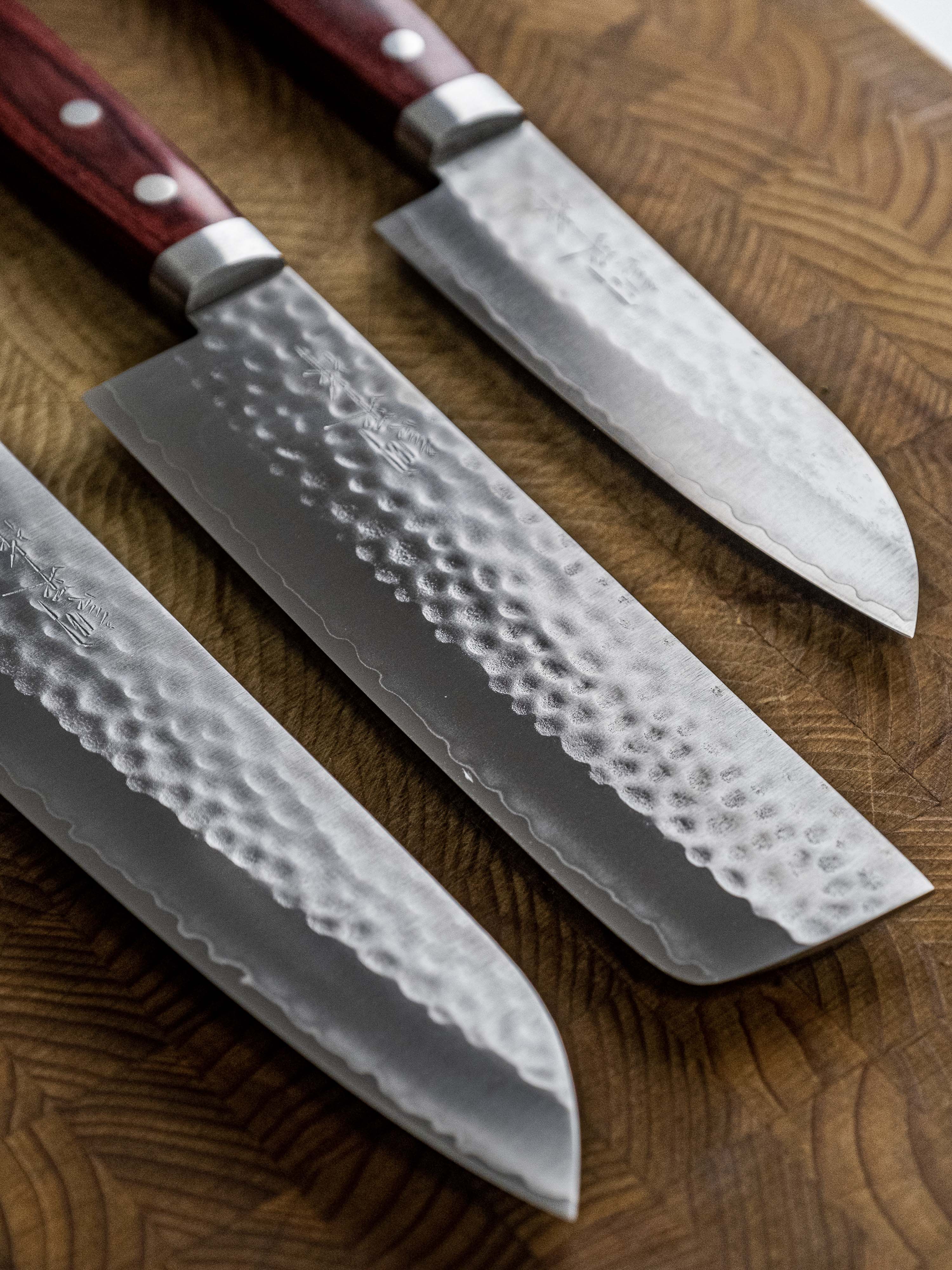Menu


Fujiwara Three Piece Combo
- Sale price
- $1,599.95
- Regular price
- $2,400.34
- You save
- $800.39 (34%)
Taxes and shipping calculated at checkout
Out of stock
Product Information
Bundle up and save! Follow the links below for more specs on the individual knives in the bundle :
Fujiwara Maboroshi Petty 120mm
Fujiwara Maboroshi Gyuto 210mm
Fujiwara Maboroshi Yanagiba 300mm (Scratch & Dent)
Teruyasu Fujiwara
"I want to create amazing and inspirational knives that appeal to the hearts of the users." Well, Fujiwara-san, I think it's safe to say you have done just that!
Fujiwara Maboroshi Petty 120mm
Fujiwara Maboroshi Gyuto 210mm
Fujiwara Maboroshi Yanagiba 300mm (Scratch & Dent)
Teruyasu Fujiwara
"I want to create amazing and inspirational knives that appeal to the hearts of the users." Well, Fujiwara-san, I think it's safe to say you have done just that!
Fujiwara-san is a pioneer in what we would refer to as the New age of Japanese cutlery production and is credited with expanding the forge welding technique to stainless steels creating what we call now a stainless clad knife. This technique was originally only used to laminate Iron over a harder piece of carbon steel creating an Iron clad knife, this style is still used today and is still very popular but can be difficult to maintain. A stainless clad knife has all the benefits of stainless steel and carbon steel mixed into one awesome package.
The Knives
The Knives
Knives from the Maboroshi series are highly sought after by professional chefs and home cooks alike because of their amazing sharpness, edge retention and cutting feel. They have gorgeous tsuchime finish that give them a mysterious and rustic finish, just begging you to pick it up and cut with it. Another special and unique thing about the denka series is the notch in the choil which makes this knife beyond comfortable to hold especially when using a pinch grip.
It should be noted that these knives are very thin behind the edge and are more prone to chipping than the average Japanese knife. Please thoroughly read the care instructions below before considering a purchase.
The word Yanagiba translates to "willow leaf" after the long slender shape of the blade and this knife excels at slicing proteins, more specifically raw proteins. With the single bevel design these knives get deadly sharp, but those fine edges do tend to be on the delicate side so we recommend handing your Yanagiba with care. While they can be used on cooked proteins as well, if you're looking for more versatility the double beveled Sujihiki (or "flesh slicer") is the way to go, if you're looking for focused performance, a Yanagiba can't be beat.
The word Yanagiba translates to "willow leaf" after the long slender shape of the blade and this knife excels at slicing proteins, more specifically raw proteins. With the single bevel design these knives get deadly sharp, but those fine edges do tend to be on the delicate side so we recommend handing your Yanagiba with care. While they can be used on cooked proteins as well, if you're looking for more versatility the double beveled Sujihiki (or "flesh slicer") is the way to go, if you're looking for focused performance, a Yanagiba can't be beat.
The Gyuto is the Japanese equivalent to a standard western style chef's knife and is an essential for the professional cook/chef. It is without question the most versatile knife available and can handle a wide variety of tasks. If you're a home cook they are a great option as well provided you are comfortable with the length.
The petty is the Japanese equivalent of the western style paring knife. They're usually a little longer and I could never go back after using one. The idea is all the on board work is done wit your gyuto or chef knife and everything in hand is done wit the petty. Not limited to capping strawberries, peeling, turning, or coring veggies, and smaller butchery tasks like chicken, small fish, or deboning a pork shoulder.
- Never twist or torque your knife on a cutting board or in an ingredient, this WILL cause your knife to chip. Use your knife in an up and down, forward and backward cutting motion.
- This knife is made from 3 layers of steel using a technique called Sanmai (Forge welding). It involves laminating a piece of Carbon steel with two pieces of Stainless steel giving the knife all the benefits of the carbon steel (Edge retention, ease of sharpening, cutting feel) and the Ease of Maintenance from Stainless steel. 2-3 millimeters of the carbon steel is exposed at the edge of the knife and is susceptible to rust and discouloration if not properly maintained.
- Simply Wipe the knife with a damp cloth immediately after use to keep it from rusting or discouloring.
- Wash with regular dish soap and warm water using a none abrasive sponge or cloth.
- Never put your knife in the Dishwasher. The extreme heat will ruin the wooden handle.
- Highly acidic ingredients (Onions, Tomatoes, Citrus) Will cause rust and oxidation to happen faster, thus the user must ensure the knife is wiped clean immediately after working with such an ingredient.
- Should any rust form it can be removed using a rust eraser or a mixture of Baking soda and water to simply scrub it clean.
- Avoid Bones, Frozen foods, nuts and hard candies or anything other than fruits, vegetables and proteins.
Recommended for You
- Choosing a selection results in a full page refresh.
SHOP
IN-STORE CLASSES/SERVICES
STORE POLICIES
CONTACT US
142 JAMES ST. S HAMILTON ON L8P3A2
MONDAY - SATURDAY :
11 AM to 6 PM
SUNDAY : CLOSED
195 NORSEMAN ST UNIT 14 ETOBICOKE ON M8Z0E9
MONDAY - SATURDAY :
11 AM to 6 PM
SUNDAY : CLOSED
Country/region
© 2024, SHARP Knife Shop Powered by Shopify





